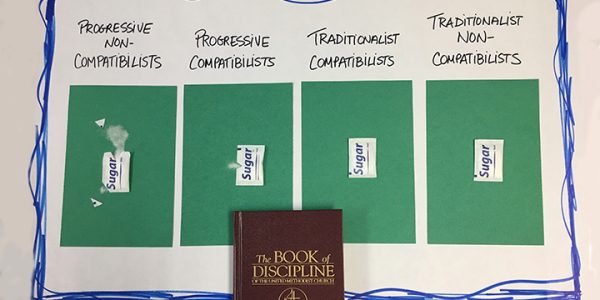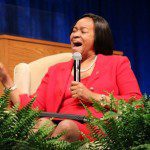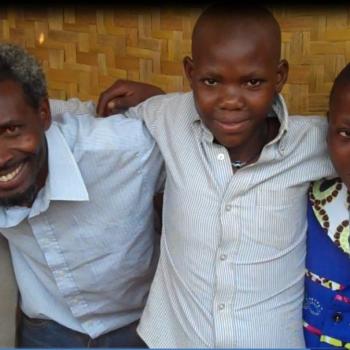In the United Methodist Church sexuality debate, one way to talk about the various constituencies is in terms of compatibilism. There are progressive non-compatibilists, progressive compatibilists, traditional compatibilists, and traditional non-compatibilists.
Non-compatibilists are people whose convictions mean that they are unwilling to remain affiliated with a church that allows others to violate their convictions. Progressive non-compatibilists want every United Methodist congregation to hold same-sex marriages and allow openly queer clergy to serve, and they will agitate and push the envelope until it happens. Conservative non-compatibilists will leave United Methodism if same-sex marriage is allowed at any United Methodist church or if it’s not punished thoroughly enough when it happens.
Compatibilists on the other hand are people who have convictions, and even strong ones, but do not demand absolute conformity to their biblical interpretation of sexuality as a condition for being in communion. Compatibilists value unity not just as a sort of lukewarm latitudinarianism but as an expression of mature Christian community. Compatibilists want the church to keep its eyes on the mission of the church rather than getting derailed by ideological absolutism.
At a young clergy gathering in Virginia with Tom Berlin, a representative from the Commission on the Way Forward, Tom asked us to raise our hands to identify which of the four groups we identified with. About 2/3 of the room were progressive compatibilists and 1/3 were traditional compatibilists. There were no non-compatibilists on either side. I imagine the results would be very different if he asked clergy from Oregon or Alabama.
I raised my hand as a progressive compatibilist partly because I didn’t want to be the one contentious outlier in the room. But as I’ve reflected on it, I’m realizing that while I want to be a compatibilist when I grow up, I’m not there yet.
I do very much value being part of a theologically diverse Christian community. Some of my most indispensable conversation partners are conservative evangelicals who are themselves compatibilist at least in the sense that they respect my integrity and try to appreciate my thought processes. We’ve had some great conversations that have deepened my theological perspective.
But I’m not very good at being a charitable conversation partner to conservative evangelicals on the internet with whom I don’t have a personal relationship. Part of my problem is that I was trained in postmodern deconstruction as an English major. So I never take anything anyone says at face value, including myself. I know that almost everything I write and say publicly is highly calculated, whether or not I’m consciously trying, so I presume that everyone else is being calculating and has an agenda beneath their stated intentions.
So I could definitely improve in my ability to listen to others with charity and an interest in finding points of agreement. Too often, I take too much pleasure in rhetorical annihilation. Too often, I get frustrated too easily with overly confident white men and respond with a blanket condemnation of that demographic.
At the same time, my zeal that gets me in trouble does have its origins in a place of love. I have more than a dozen students right now who are LGBTQ. It’s an incredible privilege to watch them blossom in Christ. Two of them grew up outside the church and have now entered into relationship with God. Six of them have rededicated their lives to Christ after having been exiled by the church because of their identity.
As a pastor, I feel more accountable to my congregation than to strangers on the internet. I don’t think that I should compromise my witness in order to appease the feelings of those who disagree with me. And I do want for all of United Methodism to stop conflating sexual and gender identity with the important work of promoting social holiness (and social justice) that has been sabotaged by our awful debate.
When I was approached this spring to perform a same-sex wedding, I thought and prayed about it but ultimately declined. I did not know the couple personally. Their pastor who is a good friend had recommended me for a destination wedding in New Orleans. I feel very conflicted and guilty about my decision. At this point, I feel that I am called to live within the boundaries of the United Methodist Discipline while advocating fiercely for the queer people whom I love.
Still I don’t think I get to call myself a compatibilist yet because I am not disciplined enough in how I conduct myself in public conversation. Too often, I let my ego get in the way of gracious, effective communication. Tom Berlin talked about the difference between talking with a heart of war and heart of peace. He is very good at modeling what a heart of peace looks like.
I don’t think compatibilists are spineless moderates. They are actually the true conservatives who listen deeply to all sides and refuse to oversimplify theological questions in order to fit an ideological us-them binary. Compatibilists have the deepest respect for the truth because they operate with the assumption that they do not own the truth absolutely. They use a hermeneutics of suspicion for themselves and charity for others.
Maybe I’ll be a compatibilist when I grow up.
Check out my book How Jesus Saves the World From Us!
Help us reach our goal of 100 monthly patrons for our campus ministry NOLA Wesley!













